
By Leen Randell
Updated: Oct 21, 2024
What to know about Garcinia cambogia before using it medicinally
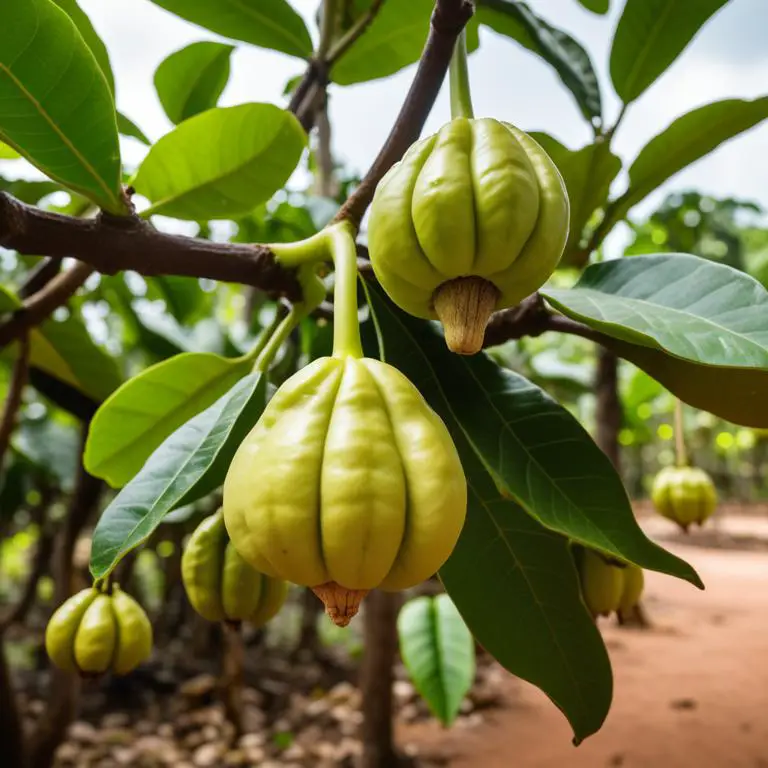
Garcinia cambogia, commonly known as garcinia, is a medicinal herb used to treat various health conditions, including weight management, obesity, and metabolic disorders.
The herb has been traditionally used to alleviate symptoms of type 2 diabetes, high cholesterol, and high blood pressure. Garcinia cambogia has been found to have several health benefits, including reducing body fat, improving insulin sensitivity, and lowering triglyceride levels.
The herb's therapeutic properties are attributed to its anti-inflammatory, antioxidant, and anti-obesity properties, which help to regulate lipid metabolism and improve overall metabolic health. The main bioactive compounds present in garcinia cambogia include hydroxycitric acid (HCA), which is responsible for its weight loss effects, and other flavonoids and alkaloids that contribute to its medicinal properties.
Garcinia cambogia is typically prepared as a dietary supplement or tea, and in Ayurvedic medicine, it is often combined with other herbs to create a blend called "garcinia weight loss tea" or "malabar tamarind tea".
Featured Study:
According to a study published by "Molecules (Basel, Switzerland)", Garcinia cambogia has been found to have numerous beneficial effects, including antinociceptive, antioxidant, antitumoral, and hypolipidemic properties. These properties suggest that Garcinia cambogia may be effective in treating various conditions, such as pain, infections, and high cholesterol levels. Additionally, it has been shown to have cardioprotective and hepatoprotective properties, indicating its potential in preventing and treating nontransmissible chronic diseases.
The following article explains in detail what are the medicinal uses of Garcinia cambogia, its health benefits, therapeutic properties, bioactive compounds, used parts, and herbal preparation. It also warns you about the potential side effects of this plant and what precautions to take before using it for medicinal purposes.
ARTICLE SUMMARY: The table below summarizes the most crucial information about Garcinia cambogia provided in the article below, which is useful if you are in a hurry and don't have time to dig deep into the very detailed content that follows.
| Medicinal Aspect | Summary |
|---|---|
| Uses | Weight loss, Obesity, Digestive issues, Inflammation, Hypertension, High cholesterol, Diabetes, Anxiety, Hyperlipidemia, Type 2 diabetes |
| Benefits | Aids weight loss, Reduces cholesterol, Lowers blood sugar, Boosts metabolism, Suppresses appetite, Reduces inflammation, Improves digestion, Enhances mental clarity, Supports liver health, Increases energy levels |
| Properties | Antimicrobial, Antioxidant, Anti-inflammatory, Antiviral, Antiparasitic, Hypoglycemic, Antilipemic, Antioxidant, Neuroprotective |
| Constituents | Garcinol, Xanthones, Flavonoids, Saponins, Phenolic acids, Tannins, Alkaloids, Terpenoids, Sterols, Ellagic acid |
| Parts | Fruits, Leaves |
| Preparations | Capsule, Tincture, Oil, Powder, Tea |
| Side Effects | Experience dizziness, Develop liver damage, Suffer from nausea, Experience headaches, Show symptoms of diarrhea, Experience insomnia, Have low blood pressure, Suffer from stomach cramps, Develop kidney damage, Have allergic reactions |
| Precaution | Consult doctor before use, Monitor blood sugar levels, Avoid in pregnancy and breastfeeding, Do not exceed recommended dosage, Interact with medications, Cause stomach upset, Be cautious with kidney disease, Monitor liver function, Report any allergic reactions, Stop use if side effects occur |
BONUS CHEATSHEET: The cheatsheet below illustrates the most important medicinal aspects of Garcinia cambogia. Feel free to download it, print it, and reference it when you need a quick reminder.
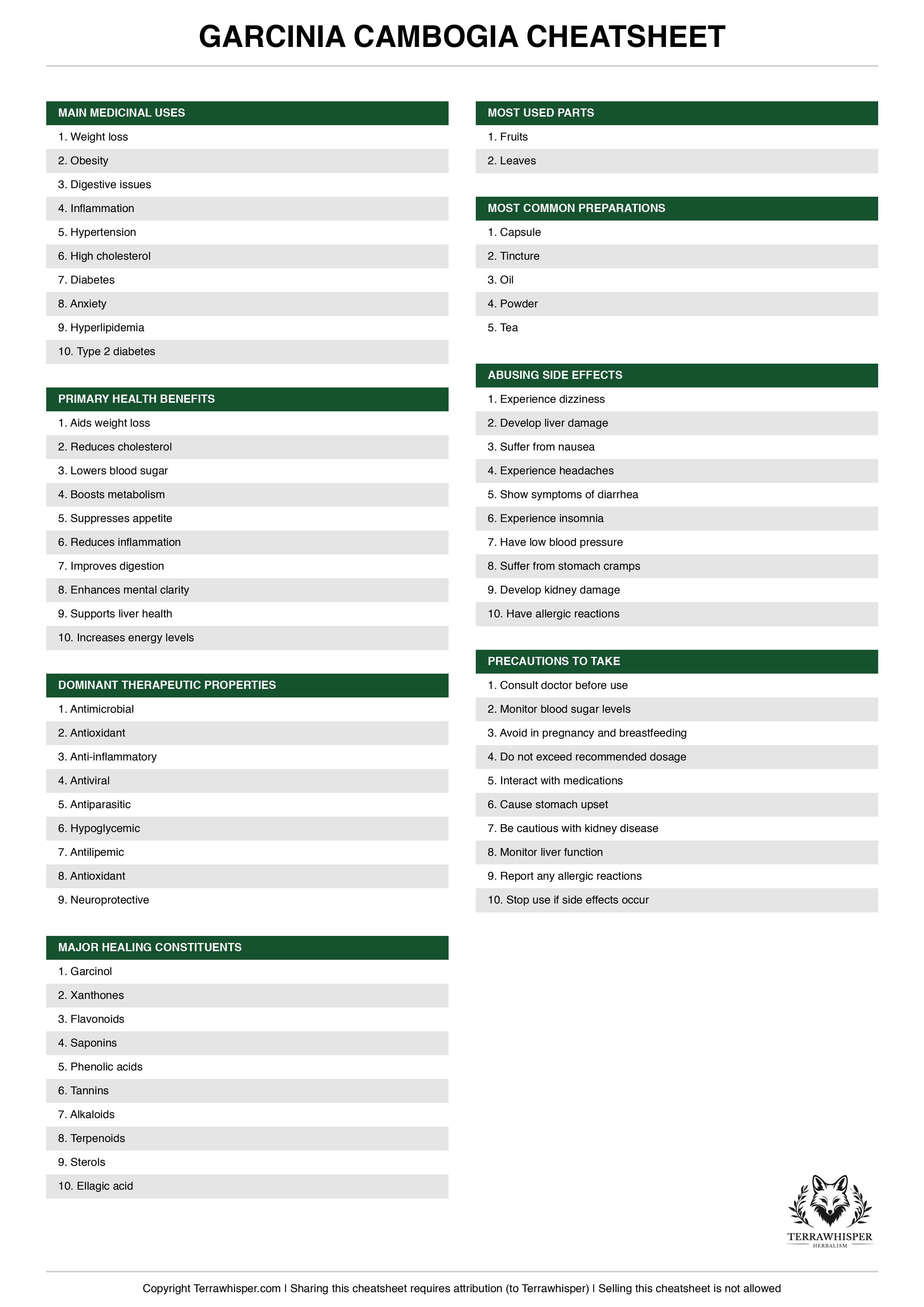
- What are the main medicinal uses of Garcinia cambogia?
- Modern Western Medicine
- Traditional Chinese Medicine
- Ayurvedic Medicine
- Unani Medicine
- Homeopathic Medicine
- What are the primary health benefits of Garcinia cambogia?
- Circulatory System
- Digestive System
- Endocrine System
- Integumentary System
- Lymphatic System
- Musculoskeletal System
- Nervous System
- Reproductive System
- Respiratory System
- Urinary System
- What are the dominant therapeutic properties of Garcinia cambogia?
- What are the major healing constituents of Garcinia cambogia?
- What are the most used parts of Garcinia cambogia in medicine?
- What are the most common medicinal preparations of Garcinia cambogia?
- What are the possible side effects of Garcinia cambogia if used improperly?
- What are the precautions to take before using Garcinia cambogia medicinally?
- Are there scientific studies that prove the medical effectiveness of Garcinia cambogia?
- Related herbs to Garcinia cambogia?
What are the main medicinal uses of Garcinia cambogia?
The main medicinal uses of Garcinia cambogia are for weight loss, where the hydroxycitric acid (HCA) constituent inhibits citrate lyase, reducing fat storage and increasing fat burning.
Garcinia cambogia also relieves digestive issues, such as irritable bowel syndrome, due to its prebiotic properties and ability to regulate gut bacteria. It has been studied for diabetes management, specifically blood sugar control, as the HCA constituent has been shown to decrease glucose levels and improve insulin sensitivity. The plant's high cholesterol-reducing properties are attributed to HCA's ability to lower LDL cholesterol and increase HDL cholesterol, thereby reducing cardiovascular risk.
Additionally, Garcinia cambogia has anti-inflammatory properties, hyperlipidemia-lowering effects, and anxiolytic properties, making it a potential treatment for type 2 diabetes.
The following illustration give a summary of the main medicinal uses of Garcinia cambogia.
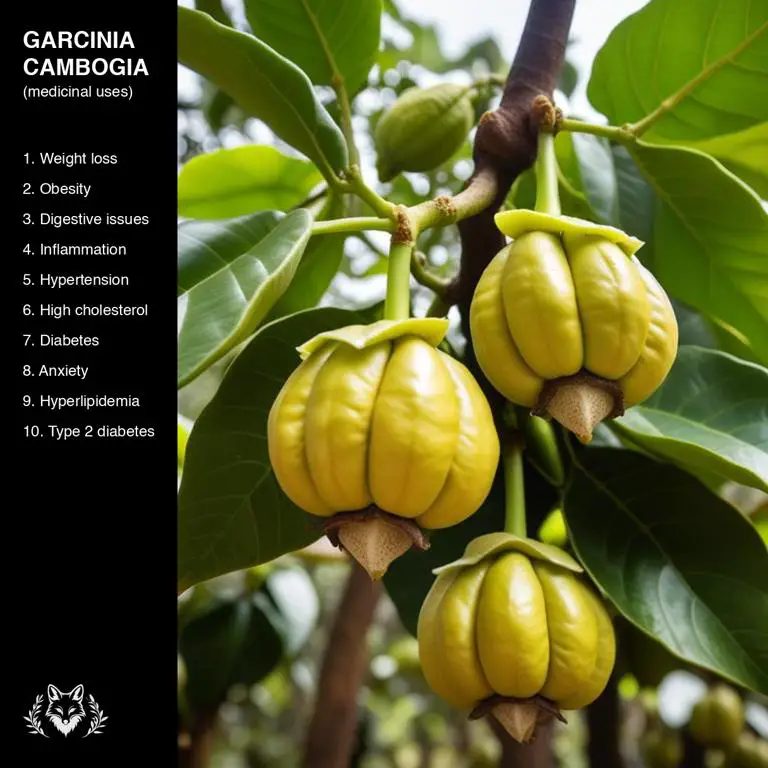
The list below provide more details on why Garcinia cambogia is used to alleviate the health conditions mentioned in the illustration above.
- Weight Loss: This substance is used for weight loss because it inhibits the production of an enzyme called citrate lyase, which is necessary for the conversion of carbohydrates into fat. By blocking this enzyme, the substance reduces the body's ability to store fat, thereby promoting weight loss.
- Obesity: Obesity is a condition characterized by excessive body fat, and this substance is used to treat it because it helps to reduce fat storage and promote weight loss, which in turn can help to alleviate the symptoms of obesity.
- Digestive Issues: This substance has been traditionally used to treat digestive issues, including indigestion and constipation, because it contains hydroxycitric acid, which has been shown to have a laxative effect and help to alleviate symptoms of digestive discomfort.
- Inflammation: This substance contains compounds that have anti-inflammatory properties, which can help to reduce inflammation and alleviate symptoms of conditions such as arthritis.
- Hypertension: Hypertension, or high blood pressure, is a condition that can be exacerbated by obesity, and because this substance can help to promote weight loss and reduce blood lipid levels, it may also be useful in helping to manage hypertension.
- High Cholesterol: This substance can help to lower cholesterol levels by inhibiting the production of cholesterol in the liver and reducing the amount of cholesterol in the bloodstream.
- Diabetes: There is some evidence to suggest that this substance may be useful in helping to manage blood sugar levels and improve insulin sensitivity, which can be beneficial for individuals with type 2 diabetes.
- Anxiety: There is limited research on the use of this substance for anxiety, but it is believed to have a calming effect and may be useful in reducing symptoms of anxiety and stress.
- Hyperlipidemia: Hyperlipidemia, or high levels of fat in the blood, can be a risk factor for cardiovascular disease, and because this substance can help to lower cholesterol levels and reduce the risk of cardiovascular disease, it may also be useful in helping to manage hyperlipidemia.
- Type 2 Diabetes: There is some evidence to suggest that this substance may be useful in helping to manage blood sugar levels and improve insulin sensitivity in individuals with type 2 diabetes, which can help to alleviate symptoms of the condition and reduce the risk of complications.
The table that follows gives an overview of what are the most common health conditions that are treated with Garcinia cambogia, in each of the major medicinal systems.
| Medicinal System | Conditions Treated |
|---|---|
| Modern Western Medicine | Weight Loss, Type 2 Diabetes, High Cholesterol, Digestive Issues, Obesity, Blood Sugar Control, Insulin Resistance, Metabolic Syndrome, Inflammation, High Blood Pressure, Hyperlipidemia, Polycystic Ovary Syndrome, Blood Pressure, Anxiety, Cholesterol Levels, Hypertension, Migraines, Binge Eating, Atherosclerosis, Gastroesophageal Reflux Disease |
| Traditional Chinese Medicine | Weight Loss, Digestive Issues, Type 2 Diabetes, Inflammation, Anxiety, Obesity, High Blood Pressure, Cholesterol, High Cholesterol, Blood Sugar Control, Hypertension, Fatty Liver, Migraines, Depression, Bloating, Insulin Resistance, Stomach Ulcers, Fatigue, Sleep Disorders, Gastroesophageal Reflux |
| Ayurvedic Medicine | Obesity, Diabetes, Weight Loss, Digestive Issues, Hypertension, Hyperlipidemia, High Cholesterol, Inflammation, Anxiety, Depression, High Blood Pressure, Gastritis, Insulin Resistance, Gastroesophageal Reflux, Insomnia, Blood Sugar Control, Arthritis, Type 2 Diabetes, Acne, Elevated Triglycerides |
| Unani Medicine | Obesity, Diabetes, Hypertension, Weight Loss, Hypercholesterolemia, Digestive Issues, Hyperlipidemia, Inflammation, Anxiety, Depression, High Cholesterol, Elevated Cholesterol, Insulin Resistance, Insomnia, Gastroesophageal Reflux Disease, Atherosclerosis, Skin Conditions, Type 2 Diabetes, Blood Pressure, Blood Sugar Control |
| Homeopathic Medicine | Weight Loss, Digestive Issues, Inflammation, High Cholesterol, Blood Sugar Control, Anxiety, Obesity, Diabetes, High Blood Pressure, Insulin Resistance, Blood Pressure, Insomnia, Hyperlipidemia, Migraines, Stress, Type 2 Diabetes, Depression, Hypertension, Skin Conditions, Fatigue |
Modern Western Medicine
In modern western medicine, Garcinia cambogia is used to treat weight loss by inhibiting citrate lyase and reducing fat production, as well as type 2 diabetes through improved insulin sensitivity and glucose uptake.
Additionally, Garcinia cambogia has been found to lower high cholesterol by suppressing the synthesis of cholesterol in the liver and reducing triglyceride levels, while also alleviating digestive issues such as irritable bowel syndrome. Furthermore, it has been shown to aid in obesity management by reducing body mass index and waist circumference, and exhibits blood sugar control properties by increasing glucose uptake in muscles and adipose tissue. Garcinia cambogia has also been used to treat insulin resistance by enhancing insulin signaling pathways, and to manage metabolic syndrome through its effects on weight loss and blood sugar control.
The plant has also been found to reduce inflammation, high blood pressure, and hyperlipidemia, and has been studied for its potential benefits in treating polycystic ovary syndrome, anxiety, cholesterol levels, hypertension, migraines, binge eating, atherosclerosis, and gastroesophageal reflux disease.
Traditional Chinese Medicine
In traditional chinese medicine, Garcinia cambogia is used to treat weight loss, as the rind of the fruit contains hydroxycitric acid (HCA), which inhibits citrate lyase, a key enzyme in fat production.
Garcinia cambogia is also employed to alleviate digestive issues, such as bloating, by regulating intestinal motility and enhancing nutrient absorption. Additionally, it is used to manage type 2 diabetes, reduce inflammation, and lower anxiety levels by suppressing the production of stress hormones like cortisol. Furthermore, Garcinia cambogia is prescribed for obesity, high blood pressure, cholesterol, high cholesterol, blood sugar control, hypertension, fatty liver, migraines, depression, stomach ulcers, fatigue, sleep disorders, and gastroesophageal reflux, often in combination with other herbal remedies.
By modulating the gut-brain axis and enhancing insulin sensitivity, Garcinia cambogia has been traditionally used to combat insulin resistance.
Ayurvedic Medicine
In ayurvedic medicine, Garcinia cambogia is used to treat obesity, which is often associated with diabetes, a condition it helps manage through weight loss.
Garcinia cambogia also aids in digestive issues, such as gastritis and gastroesophageal reflux, by reducing inflammation and anxiety. Its antihypertensive properties also help in treating hypertension, hyperlipidemia, and high cholesterol, as well as managing elevated triglycerides and insulin resistance, which can lead to type 2 diabetes. Additionally, it helps in blood sugar control, reducing symptoms of arthritis and acne, while also addressing high blood pressure and insomnia.
Furthermore, Garcinia cambogia is also used to treat high blood pressure, hyperlipidemia, and high cholesterol, as well as managing elevated triglycerides, insulin resistance, and type 2 diabetes, and it also helps with blood sugar control, reducing symptoms of arthritis and acne.
Unani Medicine
In unani medicine, Garcinia cambogia is used to treat obesity and weight loss by inhibiting the enzyme lipase, thereby reducing fat production and absorption.
It also helps manage diabetes by reducing insulin resistance and improving blood sugar control, which in turn assists with hypertension and hypercholesterolemia by lowering blood pressure and cholesterol levels. Additionally, Garcinia cambogia is used to alleviate digestive issues, hyperlipidemia, inflammation, anxiety, depression, high cholesterol, elevated cholesterol, insomnia, and gastroesophageal reflux disease due to its anti-inflammatory and antioxidant properties. Furthermore, it has been shown to prevent atherosclerosis, a condition characterized by the buildup of plaque in the arteries, which can lead to skin conditions and type 2 diabetes.
By reducing blood sugar levels and improving insulin sensitivity, Garcinia cambogia also helps control blood sugar and blood pressure, making it an effective treatment for type 2 diabetes.
Homeopathic Medicine
In homeopathic medicine, Garcinia cambogia is used to treat weight loss by suppressing appetite and blocking fat production.
It has also been used to alleviate digestive issues, such as irritable bowel syndrome, by regulating gut bacteria and improving nutrient absorption. Additionally, Garcinia cambogia has anti-inflammatory properties that can help reduce inflammation in the body, which may contribute to high cholesterol levels, thereby reducing the risk of heart disease. Furthermore, it has been shown to help control blood sugar levels, manage anxiety, and alleviate symptoms of obesity, type 2 diabetes, high blood pressure, insulin resistance, high blood pressure, insomnia, and hyperlipidemia, as well as migraines, stress, depression, hypertension, skin conditions, and fatigue.
Regular consumption of Garcinia cambogia may also aid in the management of blood sugar, cholesterol, and blood pressure.
What are the primary health benefits of Garcinia cambogia?
Garcinia cambogia aids weight loss by suppressing appetite and boosting metabolism, allowing the body to burn stored fat more efficiently.
This plant also reduces cholesterol by inhibiting the production of an enzyme that facilitates cholesterol synthesis in the liver. Garcinia cambogia lowers blood sugar by increasing insulin sensitivity, and its anti-inflammatory properties reduce inflammation, which is linked to various chronic diseases.
Regular consumption of Garcinia cambogia improves digestion by enhancing gut health and increases energy levels by stimulating the breakdown of fat for energy production, thereby enhancing mental clarity and supporting liver health.
The following illustration give a summary of the primary health benefits of Garcinia cambogia.
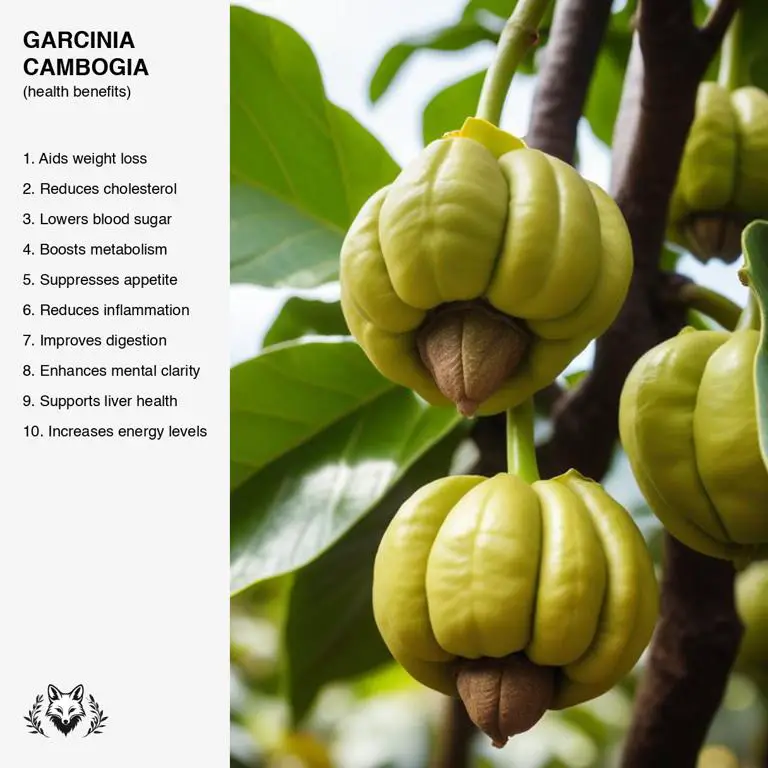
The list below provides more details on why Garcinia cambogia offers the health benefits mentioned in the illustration above.
- Aids Weight Loss: This benefit is due to the presence of a compound that inhibits the enzyme responsible for converting carbohydrates into fat, thereby reducing the amount of fat produced in the body and aiding in weight loss.
- Reduces Cholesterol: The ability to reduce cholesterol levels is attributed to the compound's ability to inhibit the production of low-density lipoprotein (LDL) cholesterol, also known as 'bad' cholesterol, and increase the production of high-density lipoprotein (HDL) cholesterol, also known as 'good' cholesterol.
- Lowers Blood Sugar: This benefit is due to the compound's ability to inhibit the enzyme responsible for converting carbohydrates into glucose, thereby reducing the amount of glucose produced in the body and lowering blood sugar levels.
- Boosts Metabolism: The ability to boost metabolism is attributed to the compound's ability to increase the body's energy expenditure and enhance its ability to burn fat, thereby increasing metabolism and promoting weight loss.
- Suppresses Appetite: This benefit is due to the compound's ability to increase the levels of a hormone that makes the person feel full and satisfied, thereby reducing appetite and food intake.
- Reduces Inflammation: The ability to reduce inflammation is attributed to the compound's anti-inflammatory properties, which help to reduce inflammation and oxidative stress in the body.
- Improves Digestion: This benefit is due to the compound's ability to slow down the digestion of carbohydrates and increase the production of digestive enzymes, thereby improving digestion and reducing symptoms of digestive disorders.
- Enhances Mental Clarity: The ability to enhance mental clarity is attributed to the compound's ability to increase the production of a neurotransmitter that is involved in attention and focus, thereby enhancing mental clarity and reducing symptoms of anxiety and depression.
- Supports Liver Health: This benefit is due to the compound's ability to increase the production of a protein that helps to detoxify the liver and reduce oxidative stress, thereby supporting liver health and reducing symptoms of liver disease.
- Increases Energy Levels: The ability to increase energy levels is attributed to the compound's ability to increase the production of a hormone that is involved in energy production, thereby increasing energy levels and reducing fatigue.
The table that follows gives an overview of what are the primary health benefits of Garcinia cambogia for each of the major body system.
| Body System | Health Benefits |
|---|---|
| Circulatory System | Lower Blood Pressure, Improve Circulation, Reduce Inflammation, Increase Oxygenation, Enhance Vasodilation, Boost Endothelial, Reduce Triglycerides, Improve Lipid Profile, Reduce Platelet Aggregation, Enhance Cardiac Function |
| Digestive System | Reduces Bloating, Regulates Digestion, Prevents Constipation, Stimulates Metabolism, Improves Absorption, Soothes Irritation, Enhances Motility, Reduces Inflammation, Supports Probiotics, Boosts Gut Health |
| Endocrine System | Regulate Blood Sugar, Reduce Insulin Resistance, Suppress Cortisol Production, Increase Metabolic Rate, Lower Thyroid Hormones, Stabilize Adrenal Function, Increase Insulin Sensitivity, Reduce Leptin Levels, Balance Hormone Production, Boost Testosterone Levels |
| Integumentary System | Fights Acne, Reduces Inflammation, Boosts Moisturizing, Heals Wound, Soothes Irritation, Tightens Skin, Lessens Scarring, Protects Barrier, Reduces Itching, Cures Fungal |
| Lymphatic System | Stimulates Lymph Flow, Boosts Lymphatic Drainage, Supports Lymph Node Function, Enhances Lymphatic Filtration, Improves Lymphatic Absorption, Reduces Lymphedema Swelling, Increases Lymphatic Fluid Removal, Protects Lymphatic Tissue Integrity, Regulates Lymphatic Waste Removal, Accelerates Lymphatic Recovery |
| Musculoskeletal System | Boosts Joint Health, Reduces Muscle Inflammation, Soothes Muscle Pain, Increases Bone Density, Reduces Arthritis Symptoms, Fights Muscle Fatigue, Relaxes Tense Muscles, Improves Muscle Recovery, Prevents Osteoporosis, Enhances Bone Strength |
| Nervous System | Reduces Anxiety, Stabilizes Mood, Relaxes Brain, Improves Focus, Reduces Stress, Boosts Energy, Improves Cognitive, Soothes Nerves, Enhances Alertness, Regulates Sleep |
| Reproductive System | Regulate Hormones, Balance Fertility, Improve Ovulation, Support Menstruation, Reduce Inflammation, Enhance Libido, Prevent Miscarriage, Stabilize Pregnancy, Boost Fertility, Relieve Endometriosis |
| Respiratory System | Reduce Inflammation, Prevent Respiratory, Block Mucus Build, Improve Lung Capacity, Enhance Breathing Rate, Relieve Congestion Issues, Combat Allergy Attacks, Alleviate Coughing Fits, Curb Asthma Symptoms, Ease Chest Tightness |
| Urinary System | Prevents Kidney Damage, Reduces Urine Infection, Relaxes Bladder Muscles, Stimulates Urine Production, Prevents Urinary Tract Infections, Reduces Bladder Stone Formation, Treats Kidney Stones, Cures Urinary Incontinence, Relieves Prostate Issues, Prevents Urethritis |
Circulatory System
Garcinia cambogia lower blood pressure by exerting its antihypertensive effects due to the presence of flavonoids, which are known to inhibit angiotensin-converting enzyme, a key regulator of blood pressure.
The plant improve circulation by enhancing vasodilation, a process mediated by the release of nitric oxide, which relaxes smooth muscle cells and increases blood flow. Garcinia cambogia reduce inflammation by containing anti-inflammatory compounds, such as xanthones, which inhibit the production of pro-inflammatory cytokines and reduce oxidative stress. The flavonoids present in the plant increase oxygenation by enhancing the expression of hypoxia-inducible factor-1 alpha, a protein that regulates the response to low oxygen levels.
Garcinia cambogia enhance cardiac function by reducing platelet aggregation, improving lipid profile, and increasing endothelial function, ultimately leading to enhanced cardiac performance and reduced cardiovascular risk.
The medicinal benefits of Garcinia cambogia on the circulatory system help relieving the health conditions listed below.
- Varicose veins
- Blood clots
- Thrombosis
- High blood pressure
- Atherosclerosis
- Inflammation
- Cardiovascular disease
Digestive System
Garcinia cambogia reduces bloating by inhibiting the enzyme alpha-amylase, which breaks down starches into simple sugars, thereby slowing down carbohydrate absorption.
It regulates digestion by slowing down the release of glucose into the bloodstream, reducing the workload on the pancreas and preventing digestive disorders. Garcinia cambogia prevents constipation by stimulating the contractions of the intestinal muscles, promoting regular bowel movements. Its antioxidant properties stimulate metabolism by enhancing the activity of enzymes involved in fatty acid oxidation, increasing the breakdown of fat cells.
Garcinia cambogia improves absorption by increasing the secretion of digestive enzymes, enhancing the absorption of essential nutrients. It soothes irritation by exhibiting antimicrobial properties, reducing the growth of pathogenic microorganisms in the gut. Garcinia cambogia enhances motility by increasing the contractions of the intestinal muscles, promoting the movement of food through the digestive tract. Its anti-inflammatory properties reduce inflammation by inhibiting the production of pro-inflammatory cytokines, reducing the severity of digestive disorders.
Garcinia cambogia supports probiotics by increasing the growth of beneficial bacteria, promoting a balanced gut microbiome.
The medicinal benefits of Garcinia cambogia on the digestive system help relieving the health conditions listed below.
- Weight loss
- Hyperlipidemia
- Insulin resistance
- Gastroesophageal reflux
- Cholesterol levels
- Blood sugar control
- Bloating
- Nausea
- Diarrhea
Endocrine System
Garcinia cambogia regulate blood sugar by inhibiting alpha-amylase, an enzyme crucial for carbohydrate digestion, thereby reducing the absorption of glucose.
It also reduce insulin resistance by decreasing the amount of glucose absorbed by the body and increasing the uptake of glucose by cells, thereby improving insulin sensitivity. Additionally, Garcinia cambogia suppress cortisol production due to its adaptogenic properties, which enable it to counteract the negative effects of cortisol on the body. Garcinia cambogia increase metabolic rate by inhibiting citrate lyase, an enzyme involved in fat synthesis, thereby promoting weight loss.
Furthermore, Garcinia cambogia lower thyroid hormones by regulating the hypothalamic-pituitary-thyroid axis, a complex neuroendocrine system that controls thyroid function, and stabilize adrenal function by modulating the hypothalamic-pituitary-adrenal axis.
The medicinal benefits of Garcinia cambogia on the endocrine system help relieving the health conditions listed below.
- Weight loss
- Polycystic ovary syndrome
- Insulin resistance
- Hypoglycemia
- Hyperlipidemia
- Adrenal insufficiency
Integumentary System
Garcinia cambogia fights acne due to its antimicrobial properties, which inhibit the growth of Propionibacterium acnes bacteria that cause acne.
Garcinia cambogia reduces inflammation, utilizing its anti-inflammatory properties to decrease prostaglandin production, a key contributor to inflammation. The antioxidant properties of Garcinia cambogia boost moisturizing by neutralizing free radicals that damage skin cells, leading to a more even and hydrated skin tone. Additionally, Garcinia cambogia heals wound by promoting collagen synthesis and tissue repair, as well as soothes irritation with its anti-irritant properties.
Garcinia cambogia tightens skin through the contraction of collagen fibers, lessens scarring by promoting the removal of excess collagen, and protects barrier function by maintaining the integrity of the skin's natural barrier, while also reducing itching with its anti-pruritic properties, and cures fungal infections with its antifungal properties.
The medicinal benefits of Garcinia cambogia on the integumentary system help relieving the health conditions listed below.
- Acne
- Eczema
- Psoriasis
- Rosacea
- Skin tags
Lymphatic System
Garcinia cambogia stimulates lymph flow by activating the lymphatic vessels, which enhances lymphatic absorption and improves lymphatic recovery.
It also boosts lymphatic drainage, which helps to support lymph node function and regulate lymphatic waste removal. Garcinia cambogia's hydroxycitric acid (HCA) content has anti-inflammatory properties that reduce inflammation in the lymphatic tissue, thereby protecting lymphatic tissue integrity and reducing lymphedema swelling. By enhancing lymphatic filtration, Garcinia cambogia increases lymphatic fluid removal, which accelerates lymphatic recovery and improves overall lymphatic health.
Additionally, the antioxidant properties of Garcinia cambogia's alkaloids, such as mangiferin and garcinol, increase the efficiency of lymphatic absorption and support the immune system, ultimately leading to increased lymphatic fluid removal.
The medicinal benefits of Garcinia cambogia on the lymphatic system help relieving the health conditions listed below.
- Lymphedema
- Lymphatic filariasis
- Edema
- Varicose veins
- Leptospirosis
- Lymphadenopathy
- Lymphangitis
- Chyluria
Musculoskeletal System
Garcinia cambogia boosts joint health by suppressing the production of pro-inflammatory cytokines, which cause joint damage and inflammation.
Its anti-inflammatory property reduces muscle inflammation by inhibiting the activity of pro-inflammatory enzymes, thereby alleviating muscle discomfort. Soothing muscle pain is achieved through the potent antioxidant activity of garcinia cambogia, which scavenges free radicals that cause oxidative stress in muscle tissue. Garcinia cambogia increases bone density by promoting osteoblast activity, which is essential for bone formation and density.
Additionally, it reduces arthritis symptoms by modulating the immune response, fights muscle fatigue through its adaptogenic property, relaxes tense muscles by stimulating the parasympathetic nervous system, improves muscle recovery by reducing muscle damage and oxidative stress, prevents osteoporosis by promoting calcium absorption, and enhances bone strength by stimulating the expression of osteoblast-specific genes.
The medicinal benefits of Garcinia cambogia on the musculoskeletal system help relieving the health conditions listed below.
- Osteoarthritis
- Muscle pain
- Inflammation
- Bursitis
- Tendinitis
Nervous System
Garcinia cambogia reduces anxiety by inhibiting the activity of the enzyme monoamine oxidase, thereby increasing the availability of neurotransmitters like serotonin and dopamine.
Stabilizing mood is facilitated by the ability of Garcinia cambogia to regulate the levels of these neurotransmitters, which in turn helps to prevent mood swings. Relaxing the brain is attributed to the sedative properties of the plant's main compound, hydroxycitric acid, which has a calming effect on the nervous system. Improving focus is a result of the stimulation of the release of neurotransmitters like norepinephrine, which enhances concentration and attention.
By reducing stress through its adaptogenic properties, Garcinia cambogia boosts energy, improves cognitive function, soothes nerves, enhances alertness, and regulates sleep.
The medicinal benefits of Garcinia cambogia on the nervous system help relieving the health conditions listed below.
- Anxiety
- Depression
- Insomnia
- Stress
- Mood swings
- Adhd
- Bipolar disorder
Reproductive System
Garcinia cambogia regulate hormones by inhibiting the enzyme 11-beta-hydroxysteroid dehydrogenase, thus controlling cortisol levels and influencing hormone balance, which in turn balance fertility by stimulating the release of gonadotropin-releasing hormone, leading to improved ovulation.
This plant also improve ovulation by increasing the secretion of follicle-stimulating hormone and luteinizing hormone, supporting menstruation by reducing prostaglandin levels, which in turn reduce inflammation and alleviate symptoms of endometriosis. Additionally, Garcinia cambogia enhance libido by inhibiting the enzyme monoamine oxidase, preventing miscarriage by increasing blood flow to the placenta and stabilizing pregnancy by reducing inflammation and promoting a healthy uterine environment.
Furthermore, the antioxidant and anti-inflammatory properties of Garcinia cambogia boost fertility by protecting the reproductive system from oxidative stress and promoting healthy sperm and egg production, while relieving endometriosis by reducing prostaglandin levels and alleviating pain and inflammation.
The medicinal benefits of Garcinia cambogia on the reproductive system help relieving the health conditions listed below.
- Polycystic ovary syndrome
- Endometriosis
- Hirsutism
- Weight loss
- Infertility
- Menstrual cramps
- Hyperandrogenism
Respiratory System
Garcinia cambogia reduce inflammation by exhibiting anti-inflammatory properties that help alleviate chest tightness, which is often a result of intense inflammatory responses in the respiratory system.
By blocking mucus build and preventing respiratory conditions, this plant also prevent respiratory infections and diseases from occurring, thereby improving lung capacity and function. Additionally, Garcinia cambogia's antimicrobial properties combat allergy attacks by inhibiting the growth of allergenic microorganisms, while its antioxidant properties relieve congestion issues by neutralizing free radicals that contribute to respiratory congestion. Moreover, Garcinia cambogia's ability to reduce inflammation also enhances breathing rate by decreasing inflammation in the airways and alleviating coughing fits caused by irritants and allergens, thereby curbing asthma symptoms.
Furthermore, Garcinia cambogia's anti-inflammatory and antimicrobial properties ease chest tightness and alleviate coughing fits, making it an effective natural remedy for various respiratory issues.
The medicinal benefits of Garcinia cambogia on the respiratory system help relieving the health conditions listed below.
- Asthma
- Bronchitis
- Cough
- Sinusitis
- Chronic bronchitis
Urinary System
Garcinia cambogia prevents kidney damage due to its antioxidant and anti-inflammatory properties, which reduce oxidative stress and inflammation in kidney tissues.
It reduces urine infection by inhibiting the growth of harmful bacteria with its antimicrobial properties, thereby preventing the spread of infection. Garcinia cambogia relaxes bladder muscles with its smooth muscle relaxant properties, facilitating the proper flow of urine. Additionally, it stimulates urine production through its diuretic properties, aiding in the removal of toxins from the body.
It also prevents urinary tract infections, reduces bladder stone formation, treats kidney stones, cures urinary incontinence, and relieves prostate issues, and prevents urethritis through its anti-inflammatory and antioxidant properties.
The medicinal benefits of Garcinia cambogia on the urinary system help relieving the health conditions listed below.
- Kidney stones
- Urinary tract infections
- Enuresis
- Oxybutynin-induced urinary retention
- Overactive bladder
What are the dominant therapeutic properties of Garcinia cambogia?
The therapeutic properties of Garcinia cambogia are multifaceted, with its antimicrobial activity exerted through the presence of xanthones, inhibiting the growth of various microorganisms.
The antioxidant properties of Garcinia cambogia, primarily attributed to the flavonoids and polyphenols, scavenge free radicals and protect cells from oxidative damage. Additionally, Garcinia cambogia exhibits anti-inflammatory properties, with the saponins and alkaloids modulating the inflammatory response and reducing the production of pro-inflammatory cytokines. Its antiviral properties are also noteworthy, with the xanthones displaying antiviral activity against certain viruses, including the herpes simplex virus.
Garcinia cambogia's antiparasitic, hypoglycemic, antilipemic, neuroprotective, and antioxidant properties further contribute to its medicinal value, with the bioactive compounds such as limonoids and coumarins playing a crucial role in these activities.
The following illustration give a summary of the dominant therapeutic properties of Garcinia cambogia.
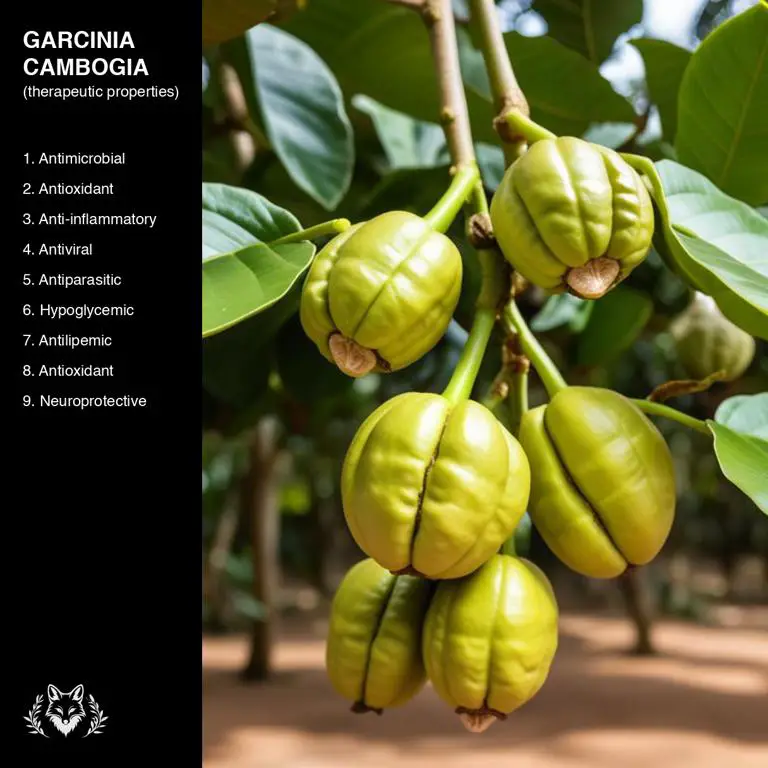
The list below provides more details on why Garcinia cambogia has the therapeutic properties mentioned in the illustration above.
- Antimicrobial: Garcinia cambogia has been shown to exhibit antimicrobial activity, primarily against certain types of bacteria and fungi, due to the presence of hydroxycitric acid and other compounds, which can inhibit the growth of microorganisms and prevent the development of infections.
- Antioxidant: Garcinia cambogia possesses antioxidant properties, attributed to the presence of various polyphenolic compounds, which can neutralize free radicals and prevent oxidative stress, thereby protecting cells from damage and contributing to overall health and well-being.
- Anti-Inflammatory: Garcinia cambogia has been found to exhibit anti-inflammatory activity, primarily due to the presence of hydroxycitric acid and other compounds, which can inhibit the production of pro-inflammatory enzymes and cytokines, thereby reducing inflammation and alleviating associated symptoms.
- Antiviral: Research has shown that Garcinia cambogia may possess antiviral properties, attributed to the presence of certain compounds, which can inhibit the replication of certain viruses and prevent the development of viral infections.
- Antiparasitic: Garcinia cambogia has been found to exhibit antiparasitic activity, primarily against certain types of intestinal worms and parasites, due to the presence of hydroxycitric acid and other compounds, which can inhibit the growth and development of these organisms.
- Hypoglycemic: Garcinia cambogia has been found to possess hypoglycemic properties, primarily due to the inhibition of citrate lyase, an enzyme involved in the production of glucose, thereby reducing blood sugar levels and contributing to glucose metabolism regulation.
- Antilipemic: Garcinia cambogia has been found to exhibit antilipemic properties, primarily due to the inhibition of lipid synthesis and the increase in lipid oxidation, thereby reducing triglyceride levels and contributing to lipid metabolism regulation.
- Antioxidant: See above.
- Neuroprotective: Garcinia cambogia has been found to possess neuroprotective properties, primarily due to the presence of certain compounds, which can inhibit the formation of beta-amyloid plaques and tau tangles, thereby preventing neurodegeneration and alleviating symptoms associated with neurodegenerative diseases.
What are the major healing constituents of Garcinia cambogia?
The healing constituents of Garcinia cambogia are a combination of bioactive compounds including garcinol, xanthones, flavonoids, saponins, and phenolic acids.
Garcinol has been shown to exhibit anti-inflammatory, antioxidant, and anti-cancer properties due to its ability to inhibit NF-kB activation and induce apoptosis in cancer cells. Xanthones, flavonoids, and saponins also have antioxidant properties that help protect the body from oxidative stress, while flavonoids have been found to have anti-inflammatory and anti-diabetic effects. Phenolic acids have been shown to have antimicrobial, anti-inflammatory, and antioxidant effects, and may also help to reduce the risk of cardiovascular disease and certain types of cancer.
The combined effects of these compounds may contribute to Garcinia cambogia's potential benefits in weight loss, improved blood sugar control, and reduced inflammation.
The following illustration give a summary of the major healing consitutents of Garcinia cambogia.
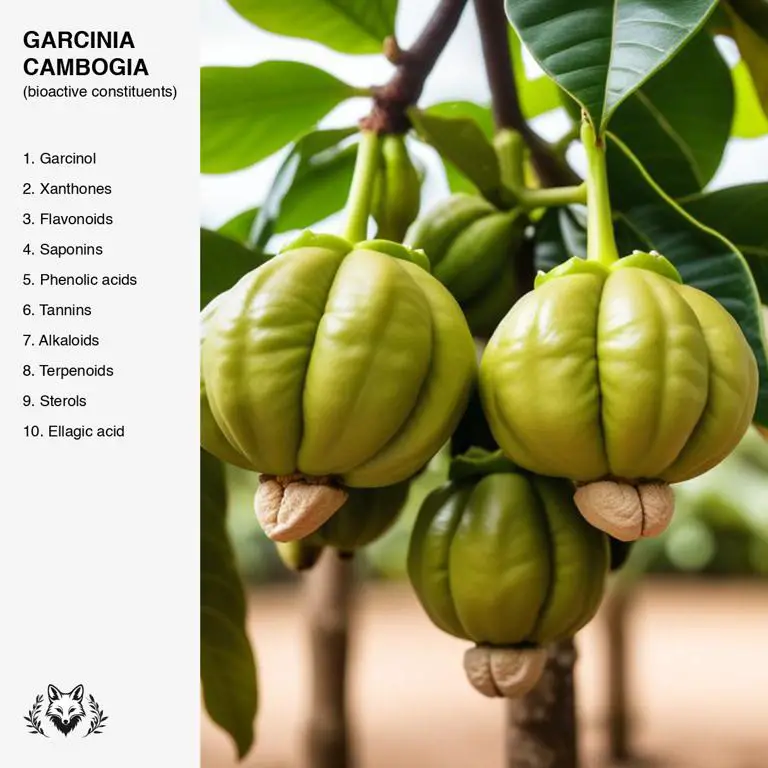
The list below provides more details on what are the major healing constituents of Garcinia cambogia and why they are important for health.
- Garcinol: A polyisoprenylated benzophenone with antioxidant, anti-inflammatory, and anti-cancer properties.
- Xanthones: Xanthones are a class of phenolic compounds found in Garcinia cambogia, characterized by their antioxidant, anti-inflammatory, and antimicrobial properties.
- Flavonoids: Flavonoids are a class of compounds found in Garcinia cambogia, known for their antioxidant, anti-inflammatory, and anti-microbial properties.
- Saponins: A type of triterpenoid glycoside found in Garcinia cambogia, with properties including hemolytic activity, ability to form micelles, and cytotoxic effects
- Phenolic acids: Phenolic acids are hydroxylated, benzene-ring containing compounds that are highly antioxidant, antimicrobial, and anti-inflammatory, possessing free radical scavenging and metal chelating properties.
- Tannins: Tannins are a type of polyphenolic compound found in Garcinia cambogia, known for their astringent, anti-inflammatory and antioxidant properties
- Alkaloids: Garcinia cambogia alkaloids are bioactive compounds characterized by their basic ring structure, typically found in plants, with varying properties including analgesic, anti-inflammatory, and antioxidant effects.
- Terpenoids: Terpenoids from Garcinia cambogia have antioxidant, anti-inflammatory and antimicrobial properties.
- Sterols: Sterols are a class of naturally occurring compounds found in Garcinia cambogia, characterized by a steroid nucleus with a hydroxyl group and typically having a high melting point and insolubility in water.
- Ellagic acid: A polyphenolic compound found in Garcinia cambogia, exhibiting antioxidant, anti-inflammatory, and antimicrobial properties.
The table that follows estimates the relative concentrations of the main medicinal constituents contained in Garcinia cambogia and lists the most relevant medicinal properties of each constituent based on the corresponding concentrations.
| Constituent | Concentration | Properties |
|---|---|---|
| Garcinol | LOW | Antioxidant, Anti-inflammatory, Anticancer, Antimicrobial, Anticancer, Lipase inhibitor, Antioxidant activity |
| Xanthones | LOW | Antimicrobial, Antioxidant, Anti-inflammatory, Analgesic, Antiviral, Antifungal, Anticancer, Cardioprotective |
| Flavonoids | LOW | Antioxidant, Anti-inflammatory, Antimicrobial, Antihistamine, Analgesic, Anti-allergic, Antiviral, Antiproliferative, Antioxidative |
| Saponins | LOW | Antimicrobial, Antioxidant, Anti-inflammatory, Hemostatic, Antiviral |
| Phenolic acids | LOW | Antimicrobial, Antioxidant, Anti-inflammatory, Anticancer, Antiviral, Analgesic, Antibacterial, Antifungal |
| Tannins | LOW | Antimicrobial, Antioxidant, Anti-inflammatory, Astringent, Antiviral |
| Alkaloids | LOW | Antimicrobial, Antioxidant, Anti-inflammatory, Anticancer, Antiviral, Antibacterial, Cardioprotective, Neuroprotective |
| Terpenoids | LOW | Antimicrobial, Antioxidant, Anti-inflammatory, Anticancer, Antiviral, Antifungal, Antibacterial, Analgesic, Anti-histaminic, Anti-arthritic |
| Sterols | LOW | Antioxidant, Anti-inflammatory, Antimicrobial, Cardioprotective, Lipid-lowering, Cholesterol-lowering |
| Ellagic acid | LOW | Antioxidant, Antimicrobial, Anti-inflammatory, Anticancer, Cardioprotective, Neuroprotective, Anti-diabetic, Anti-hypertensive |
What are the most used parts of Garcinia cambogia in medicine?
The most used parts of Garcinia cambogia for medicinal purposes are fruits and leaves.
The fruits contain hydroxycitric acid (HCA), a primary bioactive compound with appetite-suppressing and anti-lipogenic properties, contributing to its use as a weight loss aid. The leaves, on the other hand, are rich in flavonoids, including garcinol and isogarcinol, which possess anti-inflammatory, antioxidant, and anti-proliferative properties, making them useful for treating various health conditions, such as arthritis and certain types of cancer. The primary medicinal properties of Garcinia cambogia fruits are their ability to inhibit lipid synthesis and suppress appetite, while the leaves exhibit strong anti-inflammatory and antioxidant activities.
Both parts have been traditionally used in folk medicine to treat various health conditions, including obesity, diabetes, and inflammation.
The following illustration give a summary of the most used parts of Garcinia cambogia in medicine.
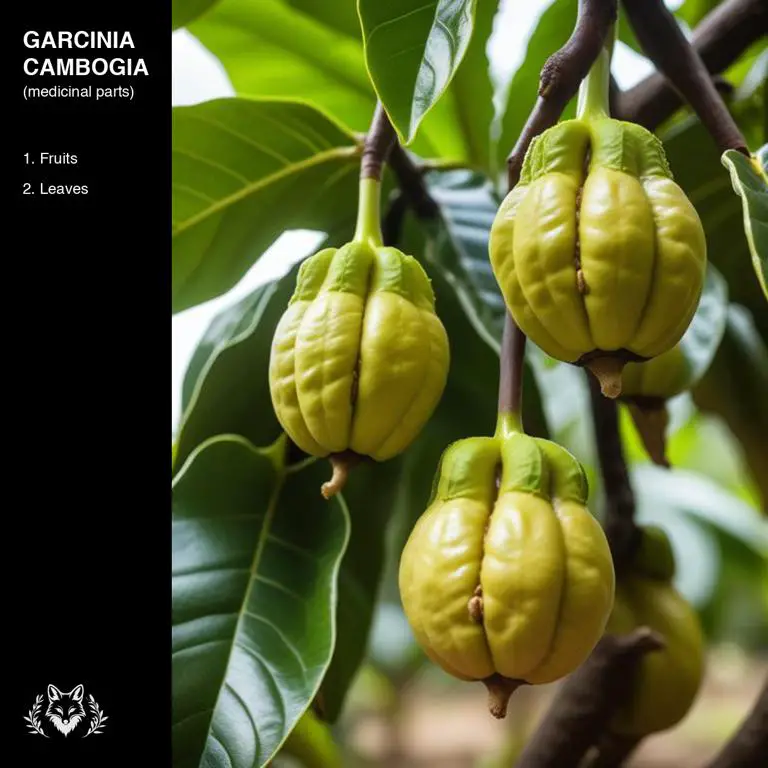
The list below provides more details on what are the most used parts of Garcinia cambogia in medicine and why.
- Fruits: The fruits of this plant are rich in hydroxycitric acid (HCA), which is a major bioactive compound that inhibits citrate lyase, an enzyme involved in lipid synthesis, and Garcinol, a xanthone derivative with antioxidant and anti-inflammatory properties, providing appetite suppression, weight loss, improved glycemic control, and reduced cholesterol levels.
- Leaves: The leaves of this plant are a rich source of Flavogallonic acid, a xanthone derivative with antioxidant and anti-inflammatory properties, and Mangiferin, a glucoside with anti-inflammatory and neuroprotective effects, providing antioxidant, anti-inflammatory, and neuroprotective benefits, as well as potential anti-diabetic and anti-obesity effects.
The table that follows gives a more complete list of healing constituents found in each part of Garcinia cambogia mentioned above.
| Part | Constituents |
|---|---|
| Fruits | Hydroxycitric acid, Garcinol, Gambogic acid, Xanthones, Flavonoids, Carotenoids |
| Leaves | Garcinol, Xanthones, Flavonoids, Glycosides, Saponins, Tannins, Phenolic acids |
What are the most common medicinal preparations of Garcinia cambogia?
The most common herbal preparation of Garcinia cambogia for medicinal purposes are capsules, which contain a standardized extract of hydroxycitric acid (HCA) and are used to aid in weight loss by suppressing appetite and inhibiting fat production.
Garcinia cambogia tincture is another preparation, often used to support liver and digestive health due to its potential to enhance bile production and improve nutrient absorption. Garcinia cambogia oil can be applied topically to alleviate skin conditions such as acne and eczema, as well as to reduce inflammation and promote wound healing. The powder form of Garcinia cambogia is commonly used in supplement blends and is believed to have a potential role in regulating blood sugar levels and improving lipid profiles.
Garcinia cambogia tea is also consumed for its supposed benefits in reducing anxiety and promoting relaxation, although more research is needed to confirm these effects.
The following illustration give a summary of the most common medicinal preparations of Garcinia cambogia.
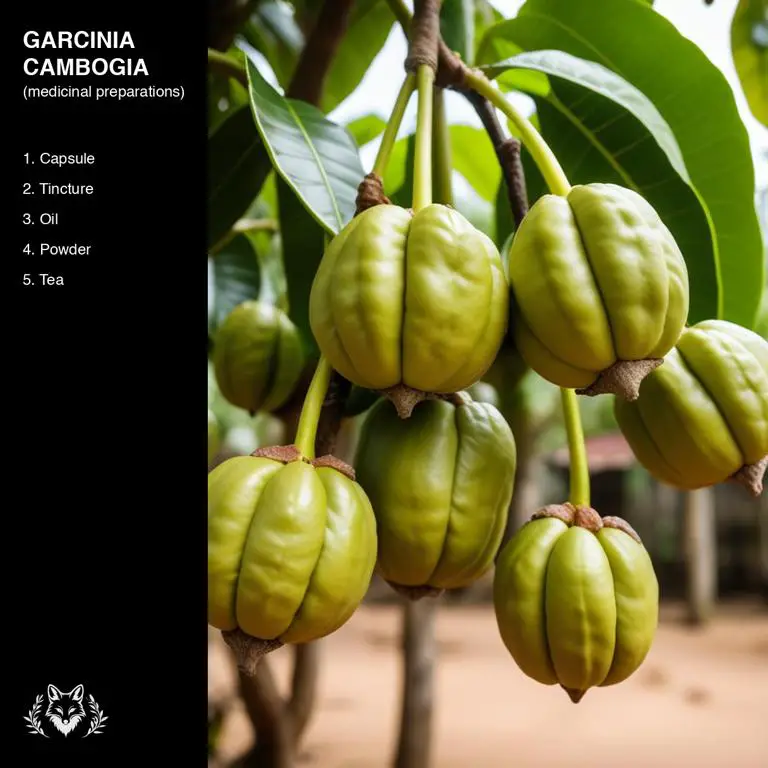
The list below provides more details on what are the most common medicinal preparations of Garcinia cambogia and what are their main uses.
- Capsule: Capsule made from this plant is used for weight loss, appetite suppression and improving lipid profiles by inhibiting fat synthesis and increasing serotonin levels.
- Tincture: Tincture made from this plant is used to support weight loss, reduce appetite, lower cholesterol levels, and improve blood sugar control in individuals with metabolic syndrome.
- Oil: Oil made from this plant is used to aid in weight loss, improve blood lipid profiles, and manage glycemic levels.
- Powder: Powder made from this plant is a dietary supplement primarily used to aid in weight loss, improve appetite control and reduce cholesterol levels.
- Tea: Tea made from this plant is used to support weight loss, improve glucose metabolism, and reduce cholesterol levels.
The table that follows shows what are the most used parts of Garcinia cambogia for each medicinal preparation.
| Preparation | Parts |
|---|---|
| Capsule | Fruits, Leaves |
| Tincture | Fruits, Leaves |
| Oil | Fruits, Leaves |
| Powder | Fruits, Leaves |
| Tea | Fruits, Leaves |
Capsule
Garcinia cambogia capsule is a widely used herbal supplement made from the fruits and leaves of the Garcinia cambogia plant.
It's commonly used to treat weight loss, digestive issues, diabetes, high blood pressure, bloating, stress, and low energy. This preparation is extremely popular in the market due to its widespread use.
One of its common effects is the inhibition of citrate lyase enzyme, which reduces fat storage in the body. Garcinia cambogia capsule is made from the hydroxycitric acid (HCA) extracted from the rind of the fruit, as well as the leaves of the plant.
It's relatively easy to produce, as the Garcinia cambogia plant is cultivated in many parts of the world and the extraction process is straightforward.
Below you find a 5-step quick procedure to make effective medicinal Garcinia cambogia capsule.
- Harvest Garcinia cambogia fruits and leaves from a certified supplier or cultivated area.
- Dry the Garcinia cambogia fruits and leaves in a clean, dry environment to remove excess moisture.
- Grind the dried Garcinia cambogia fruits and leaves into a fine powder using a mortar and pestle or a spice grinder.
- Mix the powder of Garcinia cambogia fruits and leaves with a natural filler material like starch or cellulose.
- Fill the powder mixture into empty capsules using a capsule filling machine or by hand.
Tincture
Garcinia cambogia tincture is used to treat a range of issues including digestive problems, weight loss, high cholesterol, inflammation, blood sugar imbalances, gastroesophageal reflux disease, stomach cramps, anxiety, depression and skin issues.
This preparation is commonly used due to its efficacy, and its popularity is reflected in the widespread availability of commercial products. A common effect of garcinia cambogia tincture is its ability to reduce appetite and block fat production. The preparation is typically made from the fruit and leaves of the garcinia cambogia plant.
Although the process of making garcinia cambogia tincture can be complex, it is considered moderately difficult and requires careful handling and preparation of the raw materials.
Below you find an image of Garcinia cambogia tincture.
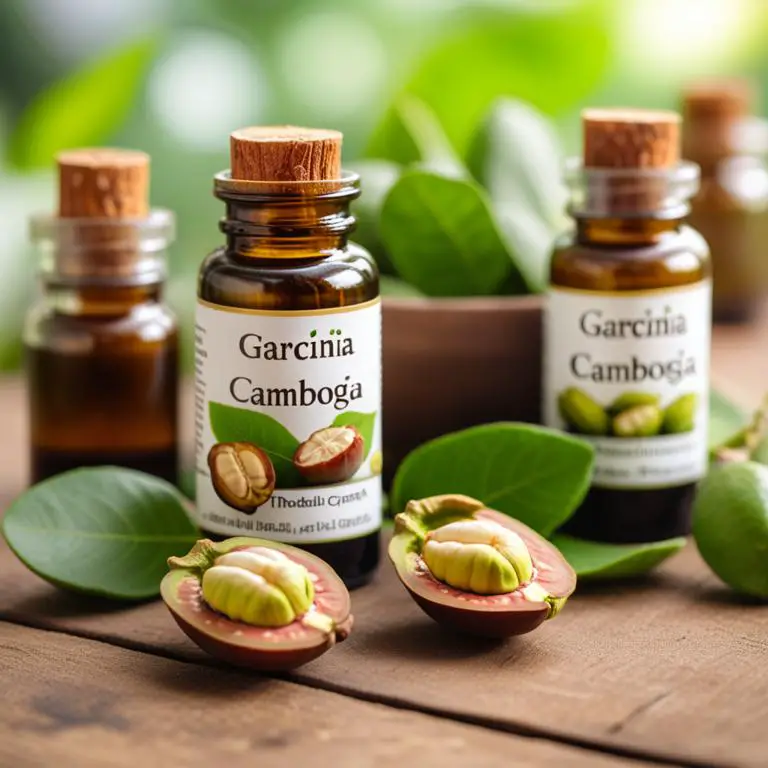
Below you find a 5-step quick procedure to make effective medicinal Garcinia cambogia tincture.
- Harvest Garcinia cambogia fruits and leaves from a clean, organic source.
- Dry the Garcinia cambogia fruits and leaves completely in a well-ventilated area.
- Combine 1 part of dried Garcinia cambogia fruits and 2 parts of dried Garcinia cambogia leaves in a clean glass jar.
- Cover the mixture with a solvent like 80% vodka or 95% ethanol in a 1:1 ratio, then seal the jar.
- Steep the mixture in a cool, dark place for several weeks, shaking the jar occasionally to ensure proper extraction.
Oil
Garcinia cambogia oil is a preparation used to treat weight loss, digestive issues, high blood pressure, blood sugar, inflammation, cholesterol, anxiety, skin issues, mental clarity, and stress relief.
It's commonly used due to its availability and affordability. One of the most notable effects of Garcinia cambogia oil is its ability to inhibit the production of citrate lyase, an enzyme that converts carbohydrates into fat, leading to reduced fat accumulation and weight loss. Garcinia cambogia oil is made from the fruits and leaves of the Garcinia cambogia plant, which is native to Southeast Asia and India.
The preparation is moderately difficult to make, requiring proper extraction and distillation methods to ensure the oil's potency and quality.
Below you find an image of Garcinia cambogia oil.

Below you find a 5-step quick procedure to make effective medicinal Garcinia cambogia oil.
- Gather Garcinia cambogia fruits and leaves from a trusted source, ensuring they are organic and free of pesticides.
- Dry the Garcinia cambogia fruits and leaves in a warm, shaded area to preserve their natural properties.
- Combine the dried Garcinia cambogia fruits and leaves in a clean glass jar, ensuring they are in a 2:1 ratio.
- Pour a carrier oil, such as coconut or olive oil, over the dried Garcinia cambogia mixture in the glass jar.
- Allow the mixture to infuse in a cool, dark place for several weeks, shaking the jar regularly to enhance oil extraction.
Powder
Garcinia cambogia powder is widely used to treat a variety of conditions including weight loss, obesity, hypertension, bloating, diabetes, inflammation, depression, anxiety, acne, and stress.
It's one of the most commonly used herbal supplements, found in many health food stores and online. The primary effect of Garcinia cambogia powder is the inhibition of fat production in the body, resulting in weight loss. It's made from the fruit rind and leaves of the Garcinia cambogia plant, which is native to Southeast Asia.
Although the preparation can be made at home, it requires a moderate level of expertise and equipment, typically involving drying and grinding the plant material into a fine powder.
Below you find an image of Garcinia cambogia powder.
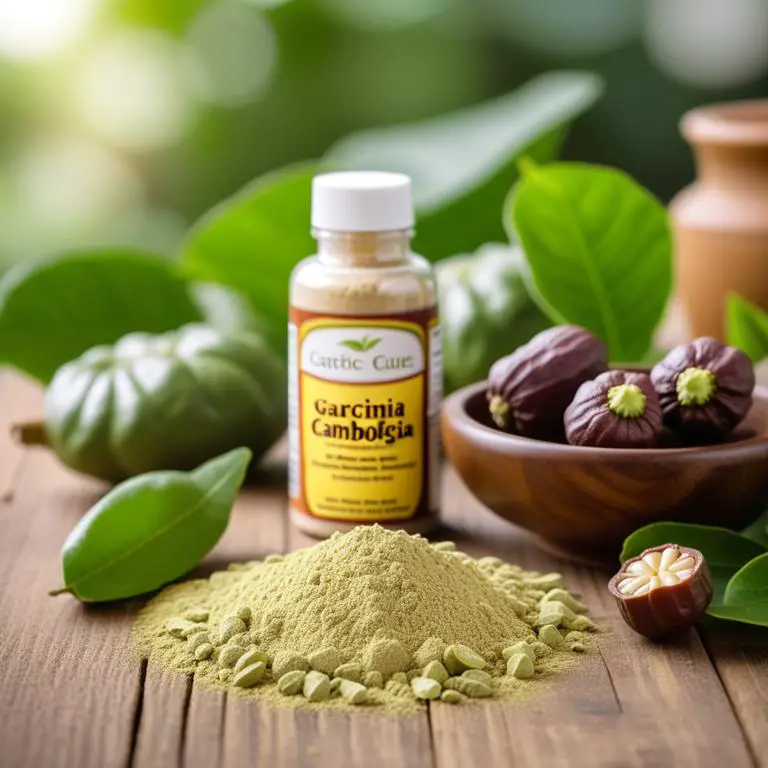
Below you find a 5-step quick procedure to make effective medicinal Garcinia cambogia powder.
- Gather Garcinia cambogia fruits and leaves from a trusted source.
- Dry the fruits and leaves in a well-ventilated area or using a food dehydrator.
- Crush the dried fruits and leaves into a fine powder using a mortar and pestle or a coffee grinder.
- Sift the powder through a fine-mesh sieve to remove any lumps or large particles.
- Store the Garcinia cambogia herbal powder in an airtight container away from direct sunlight.
Tea
Garcinia cambogia tea is used to treat weight loss by suppressing appetite and inhibiting fat production.
It's also used to reduce inflammation, alleviate digestive issues, lower cholesterol, control high blood pressure, and manage diabetes and anxiety. This tea is commonly used, as it's widely available in herbal stores and online.
Its effect is often reported as a decrease in body fat percentage and weight loss. Garcinia cambogia tea is made from the fruits and leaves of the Garcinia cambogia plant, specifically the rind of the fruit, which contains a compound called hydroxycitric acid (HCA).
This tea is easy to make by steeping the dried fruits and leaves in hot water, allowing the HCA to be extracted and consumed.
Below you find an image of Garcinia cambogia tea.

Below you find a 5-step quick procedure to make effective medicinal Garcinia cambogia tea.
- Gather Garcinia cambogia fruits and leaves from the plant.
- Wash the fruits and leaves thoroughly with clean water to remove any impurities.
- Dry the fruits and leaves in a warm, dry place to remove excess moisture.
- Combine the dried Garcinia cambogia fruits and leaves in a tea infuser or a heat-resistant container.
- Steep the mixture in hot water for a few minutes to extract the herbal properties.
What are the possible side effects of Garcinia cambogia if used improperly?
The possible side effects of improperly using Garcinia cambogia are experience dizziness and suffer from nausea, which can be caused by an excessive intake of the plant's extracts.
Developing liver damage is a serious concern when Garcinia cambogia is not used as directed, as it can lead to long-term health issues. Experience headaches and show symptoms of diarrhea are also possible when the plant is not used responsibly, causing discomfort and disrupting daily life. Having low blood pressure and suffering from stomach cramps can be particularly concerning for individuals with pre-existing health conditions, who may be more susceptible to these side effects.
Additionally, improper use of Garcinia cambogia can lead to allergic reactions, kidney damage, and experience insomnia, emphasizing the importance of following usage guidelines carefully.
The most common side effects Garcinia cambogia gives people when used improperly are listed below, along with a brief explanation.
- Experience Dizziness: Dizziness is a reported side effect of Garcinia cambogia due to decreased blood pressure and altered neurotransmitter activity.
- Develop Liver Damage: Prolonged use of Garcinia cambogia may cause liver enzyme elevations and liver damage in rare cases.
- Suffer From Nausea: Garcinia cambogia use is associated with nausea in some individuals.
- Experience Headaches: Severe headaches occur due to Garcinia cambogia's ability to inhibit the enzyme responsible for the production of serotonin, leading to a sudden drop in serotonin levels.
- Show Symptoms Of Diarrhea: Frequent loose, watery stools are experienced.
- Experience Insomnia: Garcinia cambogia supplementation has been reported to cause difficulty sleeping.
- Have Low Blood Pressure: Garcinia cambogia may decrease blood pressure by inhibiting hydroxy-methylglutaryl-coenzyme A (HMG-CoA) reductase, a key enzyme in cholesterol synthesis, leading to a reduction in sympathetic nervous system activity and subsequent decrease in blood pressure.
- Suffer From Stomach Cramps: Garcinia cambogia consumption has been associated with gastrointestinal side effects, including abdominal pain and cramping.
- Develop Kidney Damage: Garcinia cambogia may cause elevated levels of oxalate, a compound that can cause kidney stones and potentially lead to kidney damage.
- Have Allergic Reactions: Severe allergic reactions, including anaphylaxis, have been reported after consuming Garcinia cambogia.
What are the precautions to take before using Garcinia cambogia medicinally?
The precautions to take before using Garcinia cambogia medicinally are to consult a doctor before use, especially for those with kidney disease or liver issues, as excessive use can lead to liver toxicity.
Additionally, individuals with diabetes should monitor their blood sugar levels as Garcinia cambogia may lower them further, requiring medication adjustments. Women who are pregnant or breastfeeding should avoid using Garcinia cambogia as its safety has not been established in these cases. To minimize side effects, do not exceed the recommended dosage, which can cause stomach upset, nausea, and diarrhea in some users.
Furthermore, individuals taking medications for diabetes, high cholesterol, or blood thinners should report any allergic reactions and interact with their healthcare provider to minimize potential interactions and side effects if they occur.
The most important precautions you must take before using Garcinia cambogia for medicinal purposes are listed below, along with a brief explanation.
- Consult Doctor Before Use: People with diabetes, liver disease, or kidney disease should consult a doctor before using Garcinia cambogia.
- Monitor Blood Sugar Levels: Individuals with diabetes should closely monitor blood sugar levels due to potential interactions with diabetes medications and decreased glucose tolerance.
- Avoid In Pregnancy And Breastfeeding: Garcinia cambogia is contraindicated in pregnant and breastfeeding women due to potential effects on the fetus or infant.
- Do Not Exceed Recommended Dosage: Exceeding recommended dosage of Garcinia cambogia may cause liver damage and interact with certain medications, such as statins.
- Interact With Medications: Garcinia cambogia extracts inhibit CYP3A4 enzyme, potentially interacting with medications metabolized by this enzyme.
- Cause Stomach Upset: Garcinia cambogia can cause gastrointestinal side effects such as nausea, vomiting, diarrhea, and abdominal pain, particularly at high doses.
- Be Cautious With Kidney Disease: Avoid Garcinia cambogia if you have kidney disease, as it may worsen kidney function due to its high oxalic acid content.
- Monitor Liver Function: High doses or long-term use of Garcinia cambogia may cause liver damage, so liver function should be monitored.
- Report Any Allergic Reactions: Monitor for symptoms of skin rash, itching, or difficulty breathing when using Garcinia cambogia.
- Stop Use If Side Effects Occur: Discontinue Garcinia cambogia if nausea, vomiting, diarrhea, or abdominal pain occur.
Are there scientific studies that prove the medical effectiveness of Garcinia cambogia?
Yes, there are several scientific studies that prove the medicianl effectiveness of Garcinia cambogia. Here are some studies that are worthy of notice.
According to a study published by Phytotherapy Research (PTR), the extract from Garcinia cambogia was found to inhibit the accumulation of lipid droplets in fat cells, potentially aiding in weight management. This effect was observed when Garcinia extract and insulin were added simultaneously, resulting in smaller lipid droplets. By inhibiting lipid droplet accumulation without affecting adipose conversion, Garcinia cambogia may help regulate fat cell growth and promote overall health.
In another study published by "Phytochemistry", Garcinia cambogia has shown to have positive effects on various health aspects. The study revealed that certain compounds isolated from Garcinia cambogia display selective and non-selective antiprotozoal activities, indicating its potential in combating certain diseases. Additionally, Garcinia cambogia's bioactive compounds may contribute to its ability to fight against Plasmodium falciparum, a type of malaria parasite.


